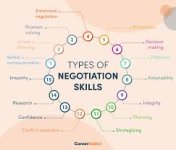Negotiation is a vital skill that plays an essential role in both professional and personal life. Whether you're closing a business deal, discussing a salary increase, or resolving a conflict, the ability to negotiate effectively can lead to favorable outcomes. Effective negotiation is not merely about getting what you want; it’s about reaching mutually beneficial agreements through communication, persuasion, and strategy.
One of the most fundamental aspects of effective negotiation is preparation. Before entering any negotiation, it’s crucial to research all relevant information and understand the needs, goals, and limitations of both parties.
Preparation builds confidence and provides a solid foundation for making informed decisions. For this another core element is active listening. Many negotiators focus too much on presenting their own arguments and fail to truly hear the other side. Active listening involves not only hearing the words spoken but also understanding the emotions and intentions behind them. This helps in building rapport and trust, which are key components in reaching a consensus.
Clear communication is also essential. A good negotiator articulates their thoughts logically and confidently. Being vague or overly aggressive can derail the discussion. Instead, expressing ideas clearly, asking relevant questions, and summarizing key points can prevent misunderstandings and keep the conversation productive. It’s also important to be assertive but not aggressive.
Emotional intelligence plays a significant role in negotiation. The ability to manage your emotions and read those of others can give you a strategic advantage. Staying calm under pressure, controlling frustration, and being aware of non-verbal cues can prevent conflicts and lead to better outcomes. Emotional intelligence also involves being adaptable; sometimes a rigid approach can hinder progress, whereas flexibility can open up new possibilities for agreement.
Another vital skill is problem-solving. Effective negotiators focus on finding solutions rather than winning arguments. They aim to create value by exploring options that benefit both sides. This requires creativity, open-mindedness, and a willingness to compromise. Instead of viewing negotiation as a battle, think of it as a collaborative process aimed at finding common ground.
Successful negotiators understand the importance of closing the deal and following up. Once an agreement is reached, it’s important to summarize the terms clearly and ensure both parties are on the same page. A written confirmation helps avoid future disputes.
One of the most fundamental aspects of effective negotiation is preparation. Before entering any negotiation, it’s crucial to research all relevant information and understand the needs, goals, and limitations of both parties.
Preparation builds confidence and provides a solid foundation for making informed decisions. For this another core element is active listening. Many negotiators focus too much on presenting their own arguments and fail to truly hear the other side. Active listening involves not only hearing the words spoken but also understanding the emotions and intentions behind them. This helps in building rapport and trust, which are key components in reaching a consensus.
Clear communication is also essential. A good negotiator articulates their thoughts logically and confidently. Being vague or overly aggressive can derail the discussion. Instead, expressing ideas clearly, asking relevant questions, and summarizing key points can prevent misunderstandings and keep the conversation productive. It’s also important to be assertive but not aggressive.
Emotional intelligence plays a significant role in negotiation. The ability to manage your emotions and read those of others can give you a strategic advantage. Staying calm under pressure, controlling frustration, and being aware of non-verbal cues can prevent conflicts and lead to better outcomes. Emotional intelligence also involves being adaptable; sometimes a rigid approach can hinder progress, whereas flexibility can open up new possibilities for agreement.
Another vital skill is problem-solving. Effective negotiators focus on finding solutions rather than winning arguments. They aim to create value by exploring options that benefit both sides. This requires creativity, open-mindedness, and a willingness to compromise. Instead of viewing negotiation as a battle, think of it as a collaborative process aimed at finding common ground.
Successful negotiators understand the importance of closing the deal and following up. Once an agreement is reached, it’s important to summarize the terms clearly and ensure both parties are on the same page. A written confirmation helps avoid future disputes.

